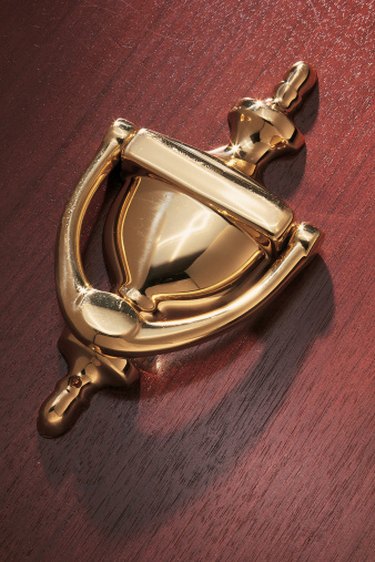
It's always gratifying to recycle something that can be used again, knowing that you're doing your part to support environmental protection efforts, but there's no denying that recycling is extra gratifying when you can get paid cash for your old things. Old scrap metal is almost always valuable to recyclers because most types can be melted down and reused over and over again without the quality degrading. Brass is one of those valuable metals, so most people will have local recycling options for how to recycle brass fixtures and old antique brass items.
How to Identify Brass
Video of the Day
Before you think about how to recycle brass, make sure you're actually dealing with brass. The type of metal you have affects your scrap metal recycling options because some recyclers only accept certain types.
Video of the Day
Household fixtures, including faucets, lighting fixtures, bed frames and doorknobs, are often made of yellow brass, which is composed of copper and zinc. You might also have items made of red brass, which is naturally reddish in color; it's made with a higher concentration of copper than yellow brass.
Both types of brass are heavy for their size and won't be attracted to a magnet. This means they're nonferrous, meaning they don't contain iron. If you think an item is brass but a magnet does stick to it, it's probably steel or another ferrous metal coated with brass plating.
How Not to Recycle Brass
While municipal recycling services might accept aluminum and tin in curbside recycling bins, these services generally aren't set up to manage scrap metal, like brass. If you're just getting rid of a small amount of brass, like a single old doorknob, it's actually better to throw it in the trash than to put it in your recycling bin and make recycling facility staff sort it out and dispose of it later.
Better yet, hold on to that old brass until you've collected enough scrap metal to warrant a trip to a metal recycler. Alternatively, if you recently upgraded some home fixtures and you're getting rid of a few brass faucets or knobs that are still functional, look into donating them to an organization, like Habitat for Humanity.
How to Recycle Brass
There's really only one option for brass recycling: turning it over to a scrap metal recycler. Some municipalities may have drop-off recycling sites that accept scrap metal, but you can also sell brass and other valuable metal to a private scrap recycling company. Contact a scrap metal recycler to make sure it accepts nonferrous scrap before dropping off your old brass. If you have ferrous scrap with brass plating, you'll want to know whether it is accepted.
Metal prices fluctuate depending on market forces, but clean brass is generally worth at least $1.50 a pound. Red brass is generally worth slightly more than yellow brass because of its higher concentration of valuable copper. If you have a large amount of both yellow and red brass, separate them before taking them to a metal recycler.
Whether the brass is clean is an important distinction. A scrap metal recycler may still buy old brass that's dirty and tarnished, but you'll generally get a lower price for it because the recycler will have to clean it. There's a quick DIY way to clean dirty brass. Wipe brass with a microfiber cloth and then rub a paste of vinegar, salt and flour into the metal. Let the paste sit for a few minutes before wiping it away. Rinse the brass and dry it with a clean cloth.